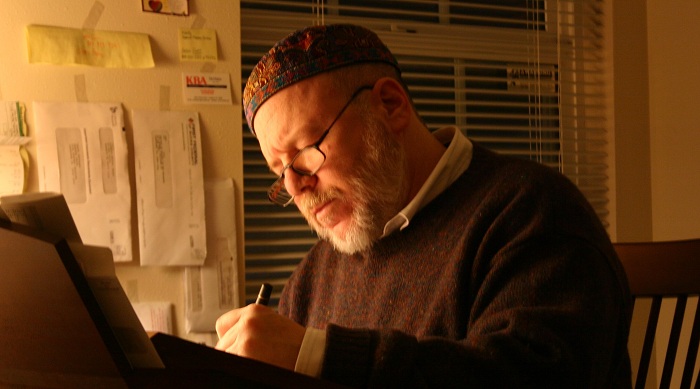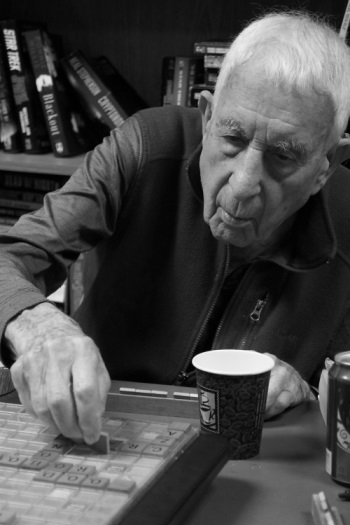 |
From the Night Factory
36. Jon Naar
During the warm months of summer, Jon Naar would appear at the bookstore toting a small backpack and carrying a camera. During the cold and icy months, Ms Keogh, my more significant other, and I have been picking up our friend Jon at his door and giving him a lift to the bookstore to spend the evening playing Scrabble. A group of enthusiasts meet every Friday night in the back of Classics Books in Trenton to play casual games of Scrabble. I dislike the game. My best reason for going is so Ms Keogh can play. Still, I enjoy the company, the kibitzing and the discussions. When it is late and the last game has been played, we drive Jon home.
Our friend, Jon, a slight and slender man, has had a rich experience in his long life. He recently turned ninety-four. We all possess stories and I enjoy mining the people I meet for their best ones. Jon is a phenomenal archive of excellent stories, like the one about his friends David Davis and Dylan Thomas leaving The White Horse Tavern after closing and banging on his apartment window in Greenwich Village, waking him and wanting more to drink.
Jon has been at work on two new books, his memoirs, one dealing specifically with his wartime experience. I regularly press him on these projects, concerned that he might procrastinate. I donít want these books left unfinished. [Are you reading this, Jon? How are you progressing?] He has been kind enough to share drafts to proofread.
We have our arguments. We share the same views on greedy corporations, pollution and natural resources, yet do not share the same politics. He is so left-leaning as to come full circle and arrive in agreement with the far right that President Obama is a tyrant. Neither of us has been able to convince the other to modify our views and it can get touchy. Politics was also an issue between Jon and his father, Alderman A.A. Naar, the first Jewish mayor of the London borough of Hendon and a member of the English Zionist Federation. Meantime, Jon was a rock-throwing anti-fascist in his youth. In recent days, we have stayed away from political subjects.

What we do agree on is the magnitude and crucial importance of the Second World War. Ms Keogh and I both grew up in the shadow of that war, the memory still reverberating in the backdrop of our childhoods. Our parents had lived through it. Jon Naar was swept into it. At fifteen he was off to the Sorbonne to study French and German. He returned to England and was at the University of London when the Second World War began. Jon was conscripted and found himself an officer in the British Intelligence Service, the British Special Operations Executive (SOE). This is not my story to tell; I must give Jon a chance to finish his book.
My story is of Sunday, 4th May 2014. Jon invited me to the New Jersey Premiere of Enemy of the Reich: The Noor Inayata Khan Story. I didn't remember who Noor Inayat Khan was at the time, but soon learned she was one of the stories in A Man Called Intrepid, a book by William Stevenson that deeply affected me when I read it over thirty-five years ago - so long ago that I didnít recognize the name Noor Inayata Khan, her codename Madeline. She spied for the British, was caught, tortured, never betrayed any information, and was executed in the Dachau Concentration Camp at the age of thirty. This hour long feature was created by UPF (Unity Productions Foundation), an organization whose aim is to increase understanding between people of different faiths and cultures, especially between Muslims and other faiths. Jon was being included in this premiere. He was to be a special guest of the UPF.
So why did they want Jon to attend? Noor Inayata Khan was in the SOE, as was Jon, although the two never met. However, Jon was to receive some kind of award for his service at this event, although he was not clear as to details. His invitation to me included a request that maybe I could drive him to the State Theatre in New Brunswick. We learned his host was sending a limousine for him.
The day came and I drove north to New Brunswick alone, Ms Keogh having an affair to attend in Philadelphia. Had it not rained that morning, I would have ridden my motorcycle to New Brunswick.
At the State Theatre, I did not sit in the seat reserved for Jonís guests, but went up to a remote corner of the balcony to watch the affair. The auditorium filled with Muslim families and many warm greetings. Everything began late. Before the film started, they brought my friend out onto the stage. Small and far away, he stood in the spotlight and received a plaque. It was my plan to make a show of respect and thought I would set an example by giving Jon a standing ovation. Before I could get my posterior off the cushion, I witnessed the entire audience leap to their feet in waves coming from several directions at once. Indeed, I remained seated just to witness and wonder, and bask in the pride that my friend was receiving a standing ovation from 1200 people.
For many people who served in that war, that Second World War remains the fulcrum of their life, the climax from which they measure the rest of their life. Even seventy years later, Jon feels himself as living postwar, yet he had many careers in that time. Assistant Editor, Medical Science Writer, Managing Editor, Associate Scientific Director for Seagram's, International Marketing Director, General Manager for Germaine Monteil Cosmetics, Deputy Director for Renewal Energy Programs, and Founder/CEO of Eco-Energy Associates. In addition, he is also the author of several books and a world renowned photographer.
After the movie, I caught up with Jon in the crowded lobby. We were joined by our mutual friend Mark.
Since Mark had a long wait for his train, Jon sent the limousine away so the three of us could have dinner together. We ate on the second floor of Efes Mediterranean Grill. While scooping hummus with pita, we three talked about Jon's wartime experience, how the war was fought and won by common men, people plucked from mundane lives, from trades and services. They were not born to a martial class, raised with fighting skills, educated in strategy, indoctrinated with a warrior philosophy, yet when called upon, they showed bravery and an unwillingness to have their lives curtailed by totalitarian regimes. If called upon to rise up again, would another generation be as capable? I ate my tas kebab and wondered if I possessed such courage, grateful to never have been called upon to find out.
We saw Mark off and I drove Jon home. At his house, I helped Jon carry a few items up several steps to his front door. We didnít realize it at the time, but we had forgotten his plaque. It was in the trunk of the car. He called me the next day, quite upset. He said it would be very embarrassing to have lost such a commemoration. I suggested a solution; he should find another war, return to espionage service, and then just wait another seventy years to have his service acknowledged with a new plaque. Jon lacked the patience to pursue my plan, so I stepped out to check the trunk of the car and found it. ďFor your courage, heroism, and service, we honor you with this award in recognition of your outstanding service during the Second World War as a member of the British Special Operations Executive (SOE)Ē
Mr Bentzman will continue to report here regularly about the events and concerns of his life. If you've any comments or suggestions, he would be pleased to hear from you.
Selected Suburban Soliloquies, the best of Mr Bentzman's earlier series of Snakeskin essays, is available as a book or as an ebook, from Amazon and elsewhere.
